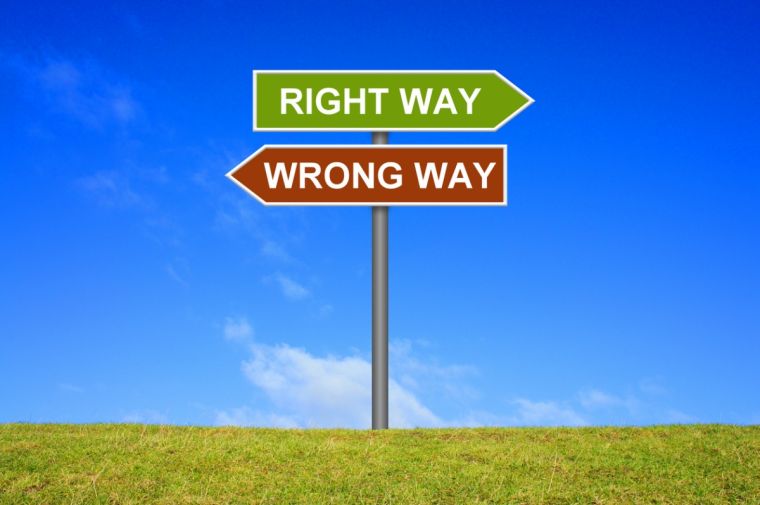Just a mistake?

Our new Prime Minister recently admitted, when questioned about his predecessors' sojourns in Downing Street, that "mistakes have been made". I want to look at that word 'mistake' and wonder if it is being used appropriately.
Mistakes are by definition 'outliers' – things that we do 'by mistake' or unintentionally. They hopefully don't represent the fullness of what we do or who we are. We all make mistakes, but if our actions are coherent with our sober understanding of the world then it is hard to describe those actions as mere mistakes.
My thesis is that the 'mistake confession' is often used to minimise damaging actions based on bad thinking, which is itself based on bad ideology. As the writer David Landrum often says, "You can trace every problem in the world back to bad theology."
Confession by mistake tries to portray the error as a 'small blip' rather than the inevitable consequence of a certain type of thinking. When someone is backed into a corner and forced to confront the obvious error but is still trying to protect their worldview or position, they call it a 'mistake'. Cabinet Office minister Gavin Williamson similarly apologised in his resignation letter.
This definition from the Century Dictionary of 1897 is particularly telling: "A mistake is a false judgment or choice; it does not, as error sometimes does, imply moral obliquity, the defect being placed wholly in the wisdom of the actor, and in its treatment of this defect the word is altogether gentle."
Which is exactly why it is the confession of choice when someone is still trying to defend their broader cause and steer their listeners away from thinking that there is a bigger moral issue or a character issue underlying the event.
By contrast, an error is described like this: "An error is a wandering from truth, primarily in impression, judgment, or calculation and, by extension of the idea, in conduct; it may be a state."
This last phrase is key. When someone is in a 'state' of error, we cannot improve their performance by suggesting they just concentrate a bit more and make fewer mistakes. We can't simply eradicate errors with a bit more proof-reading. We need to turn our focus to the underlying 'state' that is creating the errors.
We are all products of our culture, whether we like it or not. We love to imagine ourselves as free-thinking individuals but statistics prove that the majority of us will end up voting the same way our parents have. Christians are no different. We are enculturated just like everyone else, even though we like to believe we somehow swim above the tides of culture. The truth is that we are more impacted by the hundreds of hours of advertising we consume per week than the solitary hour of a sermon we consume on a Sunday.
After his fall from politics, former Welsh Secretary Ron Davies described his now famous trip to one of the seedier parts of Clapham Common as a "moment of madness". Perhaps for him it was just a moment of madness, but so often that's not the case. In our fallenness we fall into bad habits and we allow those bad habits to become normalised in our lives. That's why addictions often get worse as we slide further and further into damaging patterns of behaviour.
Gavin Williamson has been accused of suggesting to a colleague that they should "slit their throat". That sort of language doesn't come out of nowhere but from the fertile soil of aggressive posturing and actions over a period of time.
In most cases, there is more than likely a long story that precedes the 'moment'. What may look like an outrageous moment of anger or bitterness has often been rehearsed by subtly increasing off-kilter behaviour. First we take a nibble. First we have just one drink. First we just send a fun text. Then sooner or later we try to cover our backs when we get found out by saying it was just a 'mistake'.
Liz Truss and Kwazi Kwarteng's few weeks of fantasy economics were not a 'mistake'. They were an honest attempt to flesh out the ideology they had been exposed to in their particular subculture. One only needs to read a few paragraphs of their 2012 paper Britannia Unchained to realise that.
Obviously every human ideology is flawed in some way. I am simply using these particular events to make the general point rather than only shine a spotlight on the milieu of think tanks in which Liz Truss and Kwazi Kwarteng moved.
But no matter which subculture we inhabit, if we have aspirations to lead people more broadly, we need to make sure we are listening beyond the boundaries of our subculture and interacting with those we don't regard as 'true believers'.
The problem in this particular area is that we are not operating on a level playing field. Liz Truss and Kwazi Kwarteng's fantasy economics were incredibly well-funded by various bodies who mostly exist in the shadows of public life, often including those who have most to gain from a fire-sale of a nation's assets like the NHS.
Let's certainly apologise for our mistakes, but let's not mislabel them as such when they're not. The errors around Brexit and the economy that are driving the UK into lower reaches of the league of nations are not mistakes. They are errors of intention and the inevitable fruit of dangerously well-funded faulty ideology. Bad roots produce bad fruit.
Let's all look at what ideological waters we are swimming in. With the wild polarisation and the decrease in journalistic rigour of social media, we all need to keep stepping out of the water to check the temperature and the chemistry of our pool.
Andy Flannagan is executive director of Christians in Politics and author of "Those Who Show Up".











